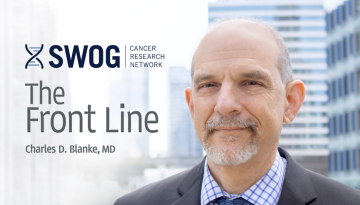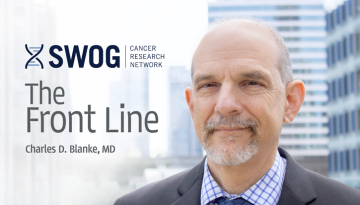Stopping Sexual Intimidation: Our Next Steps
We are publishing a special edition of The Front Line, hopefully not just in a reactive way but as a continuation of vital deliberations the SWOG Cancer Research Network has recently been engaged in. There is no doubt that over the past ten days the subjects of sexual harassment and misconduct in the cancer research community have been the focus of much deserved public discussion, and they should stay in the forefront.
As they are for ASCO, AACR, and the other cooperative cancer research networks, sexual harassment and coercion are 100% contrary to SWOG’s core values, and they will not be casually brushed aside or tolerated at any level. We’ve recently shared our plans for actively addressing diversity, equity, and inclusion at SWOG (see May 28 Front Line), and we view sexual intimidation as a piece of this critical and complex topic. We had already scheduled for later this month an online discussion of DEI within the group with about 100 SWOG members, staff, and patient advocates, and the topics of sexual harassment and gender equity will be front and center.
In considering SWOG’s responses on this specific issue, we reviewed our policies on member ethics, integrity, and misconduct. These have done a reasonable job in helping us police what we traditionally think of as scientific misconduct, such as misrepresentation of data or authorship. This is insufficient. It has become clear to us that current policies are less effective in providing guidance, standards, and consequences related to a wider range of ethical behaviors, encompassing important topics such as mutual respect for colleagues and our obligations to those we mentor. This is vital in guaranteeing all our members have the opportunity to contribute their best work and to ensure they feel safe.
SWOG policies must continue to evolve and must be more comprehensive. To help, we are convening a small task force that will, with input from our DEI consultants and other sources, draft revisions to more explicitly address respect, transparency, and equity in the workplace. We are also making plans for a “Crucial Conversations” panel on sexual harassment and gender equity as the third in our series of such events and will in the coming days invite participation by a number of potential panelists.
I’m proud of what we have done to date, but our work needs to be much more comprehensive. Key data on the issue of workplace sexual harassment gathered by Ishwaria Subbiah, MD, MS, and colleagues were just presented at the ASCO meeting, itself dedicated to “doing right by the patients for whom we care.” Our efforts need to be expanded, to improve research integrity (which of course is required to do right for those with cancer) and to ensure we do right for our colleagues as well, especially our younger and more vulnerable investigators.
Public statements about unacceptable behaviors are important to show support for oncologists whose careers have suffered because of predatory sexual harassment. But we all know actions always speak louder. What additional steps should SWOG consider?
Other Recent Stories



